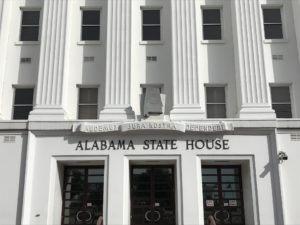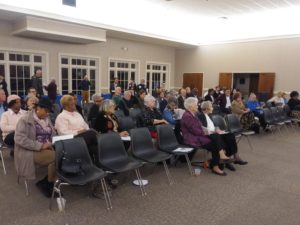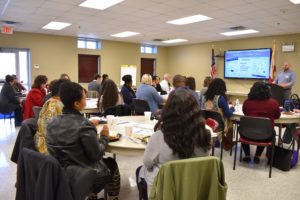Arise 2020: Our vision for a better Alabama
By Chris Sanders, communications director
Alabama Arise members have worked for more than three decades to build a brighter, more inclusive future. And we see real opportunities to advance that vision during the Legislature’s 2020 regular session, which began Feb. 4.

In this newsletter, you’ll read about how we’re building power and equipping advocates in communities across Alabama. And you’ll learn more about the grassroots work we’re doing to urge people to be counted in the 2020 Census.
You’ll also read about our goals this year on vital priorities like expanding Medicaid, untaxing groceries and funding public transportation. You can help make those goals a reality by attending Legislative Day (see below), signing up for action alerts and sharing our posts on Facebook and Twitter.
Together, we can make Alabama a place where everyone’s voice is heard. We can promote dignity, equity and justice for everyone. And we can ensure that all Alabamians have the opportunity to reach their full potential.
Arise Legislative Day is Tuesday, Feb. 25!
Your voice matters! Make plans now to speak up for a better Alabama for all at Arise’s 2020 Legislative Day on Tuesday, Feb. 25, in State House Room 200 in Montgomery.
Registration will begin at 9:30 a.m., and the event will last from 10 a.m. to 3 p.m.
Legislative Day is an annual opportunity for Arise supporters to meet their lawmakers and make the case for policy changes to improve life for everyday Alabamians. We expect this year’s advocacy to focus on important issues like untaxing groceries and funding for vital state services.
Attendance and registration are free. But we suggest a $10 donation to help offset the cost of lunch if you are able. You can make a donation online, or you can donate in person on the day of the event.
Visit our website at al-arise.local for more information. We look forward to seeing everyone there!
2020 is going to be the year of even harder work
By Robyn Hyden, executive director
Too many people I spoke with last month were feeling overwhelmed and exhausted by the news of the world. Did you feel it, too? Continuous coverage of bad news can leave all of us feeling apathetic, tired and hopeless.
But one of the first things I learned as an organizer is a lesson that history has shown again and again: Things often feel the most impossible right up until the moment big change happens.
This is a year of turning points for our state and nation. And there are plenty of ways to channel frustration toward meaningful civic engagement. Here are three:
- Vote in the 2020 elections. Check your registration status and polling place at alabamavotes.gov.
- Ensure you and your neighbors are counted in the upcoming 2020 Census.
- Check out the “Get Involved” section on our website to follow our Bills of Interest, contact legislators and learn about upcoming events.
The only way we can put these opportunities to work is to show up, speak out and organize others to come along with us. It’s hard work – and good work. A better Alabama is within our reach!
Arise members are building power across Alabama
By Presdelane Harris, organizing director
If numbers are a measure of strength, then Alabama Arise members and our allies are a mighty force! Arise supporters had a strong turnout last month at three big events leading into the legislative session.

In south Alabama, more than 60 members of Arise, the League of Women Voters (LWV) of Mobile and the Mobile NAACP came to a legislative meet-and-greet Jan. 21 in Mobile. They spoke to five lawmakers about numerous issues, including Medicaid expansion, criminal justice debt and voting rights. And almost 50 members of Arise and the LWV of Baldwin County talked with two legislators Jan. 27 at a similar event in Fairhope.

Our members showed up in north Alabama, too. Arise was well represented among the 150 advocates at the Claim Your Community Power Conference on Jan. 25 in Birmingham. Arise is one of seven partners in the Alabama Equal Voice Network, which hosted the event to educate folks about issues and build their organizing capacity in our collective effort to transform Alabama. Learn more about the network at alabamaequalvoicenetwork.org.
We thank Arise’s committed members all over the state. Your voices raised in advocacy are essential to realizing our shared vision of a better Alabama!
Why we’re spreading the word about the Census
By Mike Nicholson, organizer
Filling out your Census form is quick and easy. It only takes about 10 minutes to answer 10 questions. You won’t have to do it again for 10 years. And your answers are completely confidential.
It may not seem like much, but the stakes are high. The accuracy of Alabama’s 2020 Census count will shape our state and local communities every day. Census results determine how many U.S. House members represent each state. They also guide the distribution of more than $700 billion in federal resources every year.
That money funds health coverage through Medicaid and the Children’s Health Insurance Program (CHIP), known as ALL Kids in Alabama. It also supports Head Start, the Supplemental Nutrition Assistance Program (SNAP) and many other services that help struggling families.

Alabama Arise is part of a statewide effort to protect these programs by getting as many Alabamians counted as possible. We’ve teamed with VOICES for Alabama’s Children to travel to as many counties as we can to meet with folks and come up with a plan to make sure everyone is counted. We’re providing information and assistance to grassroots partners so they can help their communities understand how the Census affects Alabama.
Please help us spread the word. In the coming weeks, we’ll share more information about the Census’ importance and tips on persuading your community to participate. No one is a better messenger for your community than you, and Alabama’s future depends on it!
How you can support Arise from an IRA or 401(k)
By Brenda Boman, development director
Alabama Arise members are generous, caring and resourceful people. That’s why I want to highlight a powerful giving opportunity for members who are at least 70½ years of age and drawing income from a tax-deferred savings account such as a traditional IRA, 401(k), 403(k), 403(b) or Thrift Savings Plan.
Whether you itemize or take the standard deduction, up to $100,000 of your 2020 required minimum distribution (RMD) can be tax-free when you give to a 501(c)(3) nonprofit organization like Arise through a qualified charitable distribution (QCD).
The check should be payable to Alabama Arise. You can ask your account custodian to mail it directly to us. Or if you prefer, you can have the check sent to you and then mail it yourself. Our address is Alabama Arise, P.O. Box 1188, Montgomery, AL 36101.
If you ask the custodian to send the check directly, call 334-832-9060 or email me at brenda@alarise.org to notify us. That way we’ll know who to thank for the gift!
To ensure the tax benefit, apply for the QCD before you take your full RMD for 2020. You’ll need our Employer Identification Number (EIN), which is 63-1186365.
We’re grateful for your support of our advocacy for better public policies. Together, we’re making life better for families across Alabama.
Arise 2020: The issues
Compiled by policy director Jim Carnes, policy analyst Carol Gundlach and policy analyst Dev Wakeley
End Alabama’s state grocery tax and protect school funding
 Alabama’s 4% sales tax on groceries is a regressive, punitive tax on survival. It drives struggling families deeper into poverty. It costs Alabamians the equivalent of two weeks’ worth of groceries each year. And it’s time to bring this cruel tax to an end.
Alabama’s 4% sales tax on groceries is a regressive, punitive tax on survival. It drives struggling families deeper into poverty. It costs Alabamians the equivalent of two weeks’ worth of groceries each year. And it’s time to bring this cruel tax to an end.
The state grocery tax raises about $480 million a year for public schools. Given Alabama’s history of underfunding education, it’s important to replace that revenue responsibly. And we have a plan to untax groceries without cutting a dime of education funding.
Alabama Arise’s proposed solution is to end an unusual tax break for the richest Alabamians: the federal income tax (FIT) deduction. This loophole allows people to deduct their federal income tax payments on their state income taxes. About 80% of the FIT deduction’s benefit goes to the top 20% of taxpayers in Alabama, according to the Institute on Taxation and Economic Policy (ITEP).
The FIT deduction is a skewed tax break for rich households. And it’s a big reason Alabama’s tax system is upside down. For those who earn $30,000 a year, the deduction saves them about $27 on average, ITEP estimates. But for the top 1% of taxpayers, the FIT break is worth an average of more than $11,000 a year.
Alabama is one of only three states with no tax break on groceries. Ending the FIT deduction would remove us from that shameful list and enable Alabama to make additional investments in education.
Expand Medicaid to save lives and make Alabama healthier
 After a decade of missed opportunity on health coverage, Alabama needs to invest in our people and our future. We’re one of just 14 states that have rejected federal funding for Medicaid expansion to cover adults with low incomes. This can and should be the year that changes.
After a decade of missed opportunity on health coverage, Alabama needs to invest in our people and our future. We’re one of just 14 states that have rejected federal funding for Medicaid expansion to cover adults with low incomes. This can and should be the year that changes.
People and communities across our state are suffering unnecessarily due to Alabama’s inaction. Uninsured working parents, caregivers, veterans, people awaiting disability determinations, adult students and other Alabamians with low wages are putting off needed health care. Nearly 90% of our rural hospitals are operating in the red.
Medicaid expansion would strengthen our economy and health care system while guaranteeing coverage for more than 340,000 Alabamians.
Success would not require passing a bill. Gov. Kay Ivey could simply request a Medicaid rule change raising the eligibility limit for adults. A legislative panel that reviews rule changes then could allow Medicaid to seek that permission from Washington. If that gets the OK, Medicaid would simply factor expansion costs into its next annual budget.
Alabama has the money to expand Medicaid. The General Fund will have an additional $400 million available next year, state budget analysts estimate. That’s more than enough to cover the state cost for expansion: $168 million in the first year and a net of about $25 million a year thereafter.
Medicaid expansion is the single biggest step Alabama could take to make life better for people with low incomes. And Arise will continue to work hard to make it happen.
Stop the debt trap for Alabama payday borrowers
 A small loan shouldn’t be a sentence to months or years of deep debt. Everyone who needs to borrow money should have a reasonable pathway to repaying a loan without excessive costs. But in Alabama, high-interest payday loans cost struggling people tens of millions of dollars every year.
A small loan shouldn’t be a sentence to months or years of deep debt. Everyone who needs to borrow money should have a reasonable pathway to repaying a loan without excessive costs. But in Alabama, high-interest payday loans cost struggling people tens of millions of dollars every year.
The industry profits off financial desperation. Two-week payday loans with annual percentage rates of up to 456% trap many Alabamians in debt cycles they cannot escape. And Alabama’s lack of consumer protections gives those borrowers no reasonable path out of that debt trap.
The 30 Days to Pay bill – SB 58, sponsored by Sen. Arthur Orr, R-Decatur – would guarantee 30 days to repay payday loans. Unfortunately, the Senate Banking and Insurance Committee voted 8-6 against the bill on Feb. 12. It was a huge disappointment, but it didn’t reduce our determination to continue working for reform.
About one in four Alabama payday borrowers take out more than 12 loans per year. Because the loans are so short in duration – as few as 10 days – these repeat borrowers pay nearly half of all payday loan fees assessed across the state. Giving these borrowers more breathing room would help them avoid spiraling into deep debt.
Why Alabama should fund public transportation
 Public transit is vital infrastructure for a state looking toward the future. It allows people who lack other transportation options – including seniors, people with disabilities, and people who can’t afford a car – to get to work, go to the doctor and meet other basic needs. Reliable public transportation strengthens communities and makes a state more attractive to employers.
Public transit is vital infrastructure for a state looking toward the future. It allows people who lack other transportation options – including seniors, people with disabilities, and people who can’t afford a car – to get to work, go to the doctor and meet other basic needs. Reliable public transportation strengthens communities and makes a state more attractive to employers.
Alabama can expand its public transit options with a General Fund appropriation for the Public Transportation Trust Fund. Even a modest state investment could have a big impact. With a state allocation of just $10 million, for example, Alabama could receive up to $40 million in federal matching grants in return.
Public transportation funding would be an investment in our state’s economy and quality of life. Alabama could create public transit options in rural and suburban areas where they don’t exist now. Existing services could run later and more often. And all of these investments would support hundreds of stable, good-paying jobs.
Break down barriers to voting rights in Alabama
 Voting is an essential tool for people to speak out about the future they want. By breaking down barriers to voting, we promote greater civic engagement. And we make it easier for folks to make their voices heard about issues that matter in their communities.
Voting is an essential tool for people to speak out about the future they want. By breaking down barriers to voting, we promote greater civic engagement. And we make it easier for folks to make their voices heard about issues that matter in their communities.
Alabama’s shameful history of racist voting restrictions means our state has an ongoing moral obligation to strengthen voting rights. And officials have numerous policy options to remove harmful barriers to voting.
One important step would be to ensure that people who struggle to make ends meet aren’t denied the right to vote simply because they can’t afford to pay court fines and fees. Another would be to streamline Alabama’s voting system by enacting automatic voter registration (AVR).
AVR would use information the state already has to register or update registrations electronically for hundreds of thousands of Alabamians. Arise also supports proposals to allow early voting and no-excuse absentee voting.
These policy changes would strengthen our state’s democracy by extending voting access to hundreds of thousands more Alabamians. That would promote higher civic participation and stronger community involvement. And it would make our society more just and inclusive.
Fight proposals to cut Medicaid, SNAP and TANF
 The safety net is essential for people who struggle to make ends meet. Medicaid is a health care lifeline for one in four Alabamians. The Supplemental Nutrition Assistance Program (SNAP) helps one in six Alabamians keep food on the table. And the Temporary Assistance for Needy Families (TANF) program provides meager but essential cash assistance for thousands of parents living in deep poverty.
The safety net is essential for people who struggle to make ends meet. Medicaid is a health care lifeline for one in four Alabamians. The Supplemental Nutrition Assistance Program (SNAP) helps one in six Alabamians keep food on the table. And the Temporary Assistance for Needy Families (TANF) program provides meager but essential cash assistance for thousands of parents living in deep poverty.
All of these services improve lives. But in past years, we’ve seen numerous state proposals to erect barriers that would block struggling Alabamians from the help they need to survive. And we anticipate having to fight such harmful plans again this year.
Some past bills sought to stigmatize SNAP participants by requiring them to take drug tests or meet complex work reporting requirements. Others would have required photo IDs for SNAP participants or complex, costly asset tests for Medicaid, SNAP or TANF applicants. All of these proposed new limits would increase the number of sick and hungry people in Alabama.
Alabamians deserve shared prosperity and inclusion, not increased human suffering and isolation. That is why we’ll oppose cuts to Medicaid, SNAP, TANF and other programs that help people reach their full opportunity. Arise members rose to this challenge during the Farm Bill debate and in response to harmful proposed federal rule changes. And we know you will continue to help protect the safety net that protects all Alabamians when times get tough.
Stop criminal justice debt from putting lives on hold
 Criminal justice debt shouldn’t prevent a person from building a stable, secure life. But Alabama imposes millions of dollars in fines every year without considering a person’s ability to pay them. The state also conditions many rights and privileges, often including voting rights restoration, on whether a person has repaid fines.
Criminal justice debt shouldn’t prevent a person from building a stable, secure life. But Alabama imposes millions of dollars in fines every year without considering a person’s ability to pay them. The state also conditions many rights and privileges, often including voting rights restoration, on whether a person has repaid fines.
The Legislature could implement many helpful reforms, ranging from improvements in court procedure to elimination of some fees. Here are a few meaningful changes Alabama could make:
- Require courts to consider a defendant’s ability to pay fees and fines and standardize a process for that determination.
- Consider all financial obligations in ability-to-pay determinations.
- Eliminate cash bail for most misdemeanors.
- Forgive payment of fees upon acquittal or dropping of charges.
- Require reasonable and fair payment plans based on a defendant’s ability to pay.
- Prohibit incarceration for failure to pay a criminal justice debt.
- Determine the degree of and eliminate racial disparities in criminal justice debt.
- Reduce or eliminate fees for reinstatement of a suspended or revoked driver’s license.
People deserve a chance to participate in society without painful, unreasonable fines and fees dragging them down. Alabama’s criminal justice system needs system-wide reform to give thousands of people a fair chance at a fresh start.
End injustices in the death penalty system
 All Alabamians deserve equal justice under the law. But bias and inequality persist in Alabama’s capital punishment system, despite recent reforms.
All Alabamians deserve equal justice under the law. But bias and inequality persist in Alabama’s capital punishment system, despite recent reforms.
Even though the state finally outlawed judicial override in 2017, the ban did not apply retroactively. That means dozens of people who were sentenced to death despite a jury’s sentencing recommendation of life without parole remain on death row.
Alabama can and must do better than this deeply flawed system. Arise supports numerous reforms to the state’s death penalty practices:
- Apply Alabama’s judicial override ban retroactively.
- Require unanimous agreement from the jury to sentence people to death.
- Amend state law to require prosecutors to prove a defendant was 18 or older at the time of the capital crime.
- Impose a moratorium to study and end racially biased death penalty practices.
Alabama should implement these steps to reduce and eliminate the unequal, unfair practices present in the state’s death penalty scheme. Alabamians deserve a fair, unbiased justice system, and these reforms would be steps toward a more just state.


